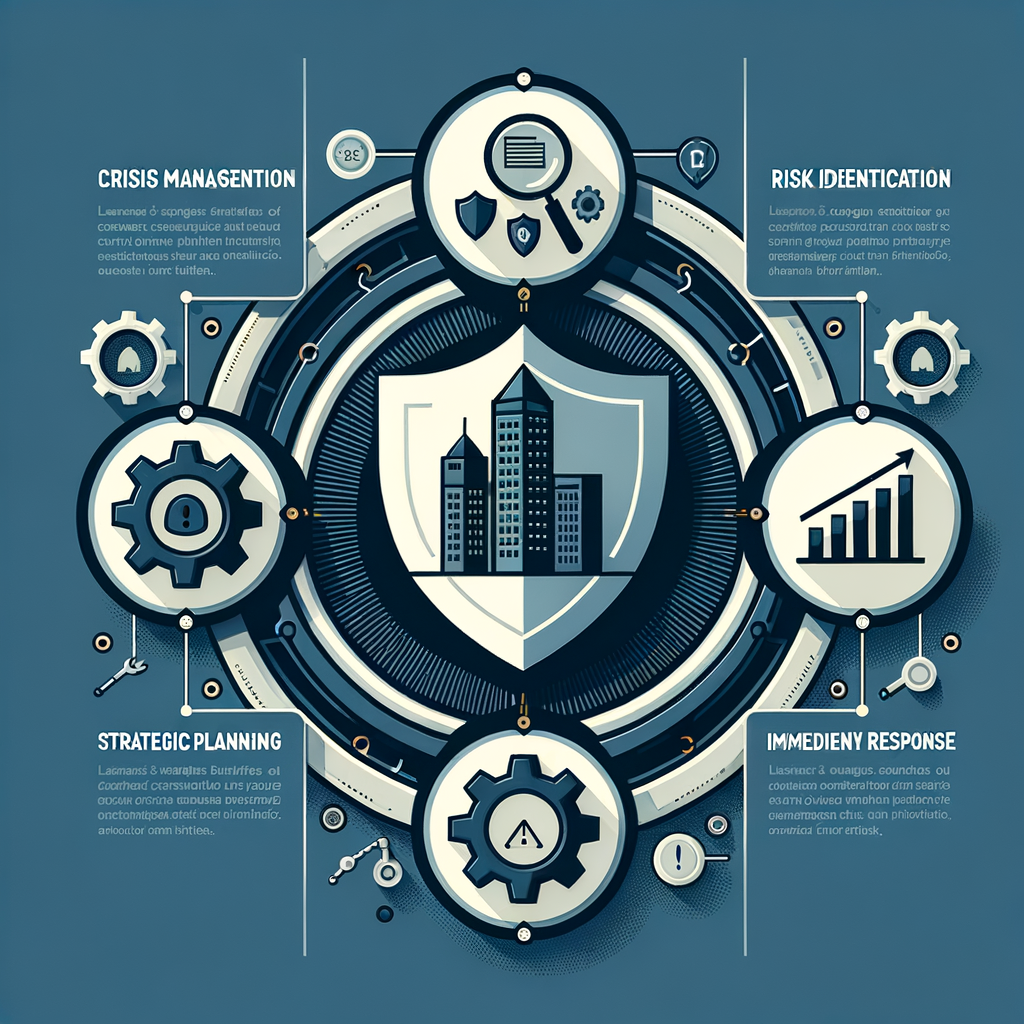The Importance of Crisis Management in India | A Guide to Preventing Business Failure
What is the importance of crisis management in preventing business failure?
Introduction
Imagine this: a sudden monsoon flood disrupts your entire supply chain, a single negative customer review about your product goes viral on social media, or an unexpected GST notice lands on your desk, demanding an immediate response. For any small business owner in India, these scenarios are not just possibilities; they are real and present dangers. This is where crisis management comes into play. In simple terms, crisis management is the proactive process of preparing for, responding to, and learning from disruptive events that threaten your business. For small and medium-sized enterprises (SMEs) across India, understanding the importance of crisis management is not a corporate luxury reserved for large conglomerates but a fundamental survival strategy. It is the crucial difference between navigating a storm with a clear plan and sinking under the weight of unforeseen challenges.
Why the Significance of Crisis Management in India is Greater Than Ever
The unique and fast-paced nature of the Indian market makes robust crisis planning an absolute necessity. The significance of crisis management in India has grown exponentially due to a combination of economic, digital, and operational factors that can turn a minor issue into a major catastrophe overnight. Ignoring these realities is a risk that modern businesses can no longer afford to take.
The Dynamic Indian Economic Landscape
India’s economy is one of the most dynamic in the world, but this dynamism comes with its own set of challenges. Businesses frequently face sudden shifts due to regulatory changes. Events like the implementation of the Goods and Services Tax (GST) or demonetization created immediate operational and financial crises for countless enterprises that were unprepared. Beyond these large-scale changes, the economic environment is marked by intense volatility and fierce competition at both local and national levels. A sudden increase in raw material costs, a shift in consumer spending habits, or a new competitor opening up next door can put immense pressure on your cash flow and market share, highlighting why crisis management importance in India cannot be overstated.
Reputation in the Digital Age
In today’s hyper-connected world, your reputation is your most valuable asset, and it’s also incredibly fragile. The proliferation of smartphones and social media in India means that every customer is a potential publisher. A single complaint about product quality, a misunderstanding with an employee, or a negative review about hygiene at a food business can be shared thousands of times within hours. This can transform a localised issue into a national reputational crisis, leading to a boycott of your brand and a severe drop in sales. A well-prepared business will have a plan to monitor its online presence and respond to negative feedback swiftly and professionally, mitigating damage before it spirals out of control.
Operational and Supply Chain Vulnerabilities
Businesses in India are often susceptible to a wide range of operational disruptions. These can include logistical nightmares on congested roads, sudden labour strikes, or natural calamities like floods and heatwaves that bring entire regions to a standstill. Such events directly impact your ability to manage inventory, fulfill orders, and deliver services to your customers. Without a backup plan, your business operations can halt completely. This is where business failure prevention strategies India become critical. A solid crisis plan anticipates these vulnerabilities by identifying alternative suppliers, establishing remote work capabilities, and creating contingency plans to ensure operations can continue, even at a reduced capacity.
The Core Role of Crisis Management in Preventing Business Failure
Understanding the need for a plan is one thing; understanding its direct impact on survival is another. The crisis management role in India is multifaceted, acting as a shield that protects a business’s core components from the destructive force of a crisis. It’s about more than just damage control; it’s about building resilience from the ground up.
Protecting Financial Stability
At its heart, almost every business crisis eventually becomes a financial crisis. A major client defaulting on a payment, a sudden product recall, or an unexpected legal penalty can trigger a severe cash flow crunch. Without a plan, businesses often resort to desperate measures that can worsen the situation. The importance of crisis management is evident here, as a good plan includes financial safeguards. These can include:
- Contingency Funds: Setting aside an emergency fund specifically for unexpected events.
- Pre-approved Credit Lines: Establishing a relationship with your bank for access to emergency funds if needed.
- Clear Financial Reporting: Maintaining up-to-date and accurate financial records so you can immediately assess the financial impact of a crisis and make informed decisions.
This financial preparedness can prevent a temporary problem from spiraling into insolvency and permanent business failure.
Maintaining Stakeholder Trust
A business is an ecosystem that relies on a network of stakeholders. For an SME, these stakeholders are not just faceless entities; they are the lifeblood of the company. They include:
- Customers: Who rely on your products and services.
- Employees: Who depend on you for their livelihood.
- Suppliers: Who extend credit and ensure your operations run smoothly.
- Lenders: Who have invested capital in your business.
A crisis puts all these relationships to the test. A poorly managed crisis—marked by silence, dishonesty, or confusion—quickly erodes the trust you have built over years. Customers will leave, employees will lose morale, and suppliers may demand cash on delivery. Conversely, a well-managed crisis, communicated with transparency, honesty, and empathy, can actually strengthen these bonds. When stakeholders see you handling a difficult situation responsibly, it reinforces their trust in your leadership and your business’s long-term viability.
Ensuring Business Continuity
The ultimate goal of crisis management is not just to survive but to continue operating. Business continuity is the ability to maintain essential functions during and after a disaster has occurred. A crisis that shuts down your operations for an extended period is often fatal. An effective crisis management plan is intrinsically linked to a business continuity plan. It outlines practical steps to keep the lights on, such as:
- Identifying and vetting alternative suppliers in advance.
- Implementing remote work policies and ensuring employees have the necessary tools.
- Having robust data backup and recovery procedures to protect critical information.
By focusing on continuity, you shift from a purely reactive mindset to a proactive one, ensuring your business can weather the storm and emerge operational on the other side.
Building an Effective Crisis Management Framework for Your Business in India
Creating a plan doesn’t have to be a daunting task. A simple, clear, and actionable crisis management framework for businesses in India is far more effective than a complex one that gathers dust. Here is a step-by-step guide to building one for your SME.
Step 1: Risk Identification and Assessment
You cannot prepare for a crisis you haven’t anticipated. The first step is to sit down with your team and brainstorm all the potential crises that could realistically affect your business. Think specifically about your industry, location, and operational model. A great way to organize this is by categorizing the risks:
- Financial Risks: A major client failing to pay, a sudden and steep increase in input costs, loss of funding, or a cash flow crisis, many of which are among the Top 10 Financial Mistakes Small Businesses Make.
- Operational Risks: The loss of a key employee, a critical machinery breakdown, failure of a primary supplier, or a warehouse fire.
- Reputational Risks: Negative social media campaigns, poor customer service going viral, product safety issues, or negative press coverage.
- Legal & Compliance Risks: Receiving a notice from the Income Tax Department or GST authorities, penalties for non-compliance with labour laws, or intellectual property disputes. This is an area where being proactive is far cheaper than being reactive, so a key step is Navigating Legal Compliance for Startups in India.
Step 2: Develop a Crisis Management Plan
Once you’ve identified potential risks, the next step is to create a clear action plan. This plan should be simple and easy to understand for everyone on your team. Key components include:
- Form a Crisis Team: Even in a small business, roles must be defined. Identify who is in charge of making final decisions (usually the owner), who will handle communications with customers and employees, and who will manage operational adjustments.
- Create a Communications Protocol: Speed and honesty are critical. Draft pre-approved message templates for various scenarios (e.g., service outage, delivery delay, product issue). This saves you from scrambling to write a statement under pressure. Decide on the primary channels for communicating with employees, customers, and the public (e.g., WhatsApp group, email, social media).
- Financial & Legal Preparedness: This is a cornerstone of effective crisis management practices India.
One of the best ways to prevent a crisis is to ensure your financial house is in order. Maintain accurate and up-to-date accounting records. Ensure you are fully compliant with all GST and income tax filings. A minor compliance slip-up can quickly escalate into a major crisis involving penalties and legal action.
Actionable Tip: Regularly verify your compliance status on the official Link to GST Portal and ensure all TDS/TCS obligations are correctly filed through the Link to Income Tax Department Portal. Having clean records is also vital if you need to secure an emergency loan during a crisis.
Step 3: Test and Update the Plan
A crisis management plan is not a “set it and forget it” document. It must be a living document that evolves with your business.
- Test the Plan: You don’t need a full-scale simulation. Run simple “what-if” tabletop exercises with your team once a quarter. For example, “What would we do if our main supplier suddenly shut down?” or “How would we respond to a string of negative Google reviews?” These drills help identify gaps in your plan.
- Update Regularly: Review and update your plan at least annually, or after any significant change in your business—such as hiring new key personnel, launching a new product, or experiencing even a minor incident. Learning from small challenges prepares you for the big ones.
Conclusion: Embracing Crisis Management for a Resilient Future
In the unpredictable Indian business environment, a crisis is not a question of *if*, but *when*. However, whether that crisis leads to failure is a choice. The importance of crisis management lies in its power to transform vulnerability into resilience. It is the framework that allows a business to absorb a shock, communicate with integrity, and continue its journey forward. Proactive planning, clear communication protocols, and robust financial and legal preparedness are the foundational pillars of effective crisis management in India. By embedding these principles into your business culture, you are not just preventing failure; you are building a stronger, more adaptable, and ultimately more successful enterprise for the future.
Don’t wait for a crisis to expose your vulnerabilities. Take control of your business’s future today. For expert guidance on strengthening your financial and legal preparedness, contact the experts at TaxRobo for a consultation.
Frequently Asked Questions (FAQs)
Q1: My business is just a one-person startup. Do I still need a crisis management plan?
Answer: Absolutely. A crisis doesn’t care about the size of your business. For a solopreneur, a plan can be simple but is still critical. It could be a one-page document that outlines: who to contact in an emergency, how your client data is backed up, the contact information for an alternate supplier, or a prepared statement in case of a service disruption. The value of a plan is in the preparedness it fosters, not its length or complexity.
Q2: What is the most common mistake Indian SMEs make during a crisis?
Answer: The most common—and damaging—mistake is poor or delayed communication. Many business owners react with a “deer in the headlights” paralysis, hoping the problem will go away if they ignore it. Hiding facts, failing to respond to customer inquiries, or not keeping employees informed creates a vacuum that will be filled with rumours, panic, and speculation. This destroys trust and often causes far more damage than the initial crisis itself.
Q3: How does staying compliant with GST and Income Tax help in crisis management?
Answer: Strong tax compliance is one of the most effective business failure prevention strategies India. Firstly, it prevents a major category of crises altogether—those originating from tax authorities in the form of notices, penalties, and legal proceedings. In essence, you are Building a Robust Financial Compliance Program to act as a shield. Secondly, during an operational or financial crisis, you may need to apply for an emergency business loan or a line of credit. Lenders will demand clean, compliant, and up-to-date financial records. Without them, securing emergency funding becomes nearly impossible, shutting off a critical lifeline when you need it most.
Q4: What is the very first step to take when a crisis hits?
Answer: The very first step is to resist the urge to react instantly. Instead, pause, take a breath, and assess the situation calmly. Your initial goal is to gather your key team member(s) (if any) and verify the facts. What do you know for sure? What is speculation? Once you have a clear, factual understanding of the problem, you can then activate your pre-defined crisis plan. A knee-jerk reaction driven by panic almost always makes the situation worse.



